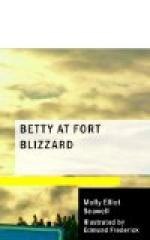McGillicuddy, standing in the moonlight among the riderless horses and grinning troopers, forestalled criticism by handing out a card on which a legend was inscribed in large letters.
“Boys,” said the Sergeant, solemnly, “there’s my rule for all married men in the service and out av it. It’s the Golden Rule of married life, boys, and it ought to be added to the Articles of War and the Regulations. Here it is, boys, ‘Doant munkey with the buzz saw.’”
Meanwhile, within the vast riding hall the splendid pageant was taking place. The lofty roof was hung with flags of all nations entwined with ropes and wreaths of Christmas greens and crimson and gold electric lights. In the middle of the roof, dark and high, hung a great silken flag of the United States, with the electric lights so arranged as to throw a halo of glory upon it. The galleries were full of officers and ladies in brilliant ball costumes for the ball that was to follow. Under the galleries the soldiers and their families were massed. Over the wide entrance door was the musicians’ gallery, where the regimental band, and Neroda, their leader, a handsome Italian, with their gleaming instruments, made a great splash of vivid color against the sombre wall. Opposite the entrance was the Commanding Officer’s box, beautifully draped with flags and wreaths of holly. In the box sat the Colonel and Mrs. Fortescue, both looking wonderfully young and handsome. The Colonel caught sight of the chaplain peering in at a window below; the chaplain knew a horse from an automobile, and loved horses too much for the good of his soul, so he thought. In a moment a messenger came with the Colonel’s compliments and the request for the chaplain’s company, and the chaplain obeyed with alacrity and a joy almost unholy.
Above the murmur of conversation and laughter the band dominated, playing soft Italian music. Suddenly and silently, as if in a dream, the great entrance doors drew apart, the band changed into a great military fanfare, and a splendid troop of cavalry charged in, the lithe young troopers and the sleek horses with muscles of steel under their satin skins, horse and man moving as one. After a dash around the hall, they proceeded to show what troopers and horses could do. The soldiers rode bareback and upside down, got on and off the horses in ways incredible, made pyramids of troopers, the horses galloping at full speed, stopped like machines, dismounted, the horses lay down and the troopers, at full length, pounded out deadly imaginary volleys into unseen enemies.
When this was over and the troopers had trotted out amid thunders of applause, the great doors again slid open as if by magic and a battery of light artillery rushed in, the band thundering out “For He Is a Son of a Gun.” The drivers, with four horses to each gun, sat like statues, as did the three artillerymen, erect, with folded arms, as straight and still as men of steel, and their backs to the horses, as the guns sped around the hall and turned and twisted marvellously, never a wheel touching, but always within three inches of disaster. Loud applause greeted the wonderful spectacle of gunners, horses and gun carriages inspired by an almost superhuman intelligence.




